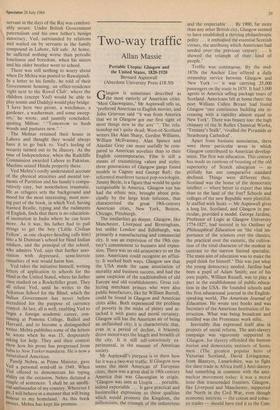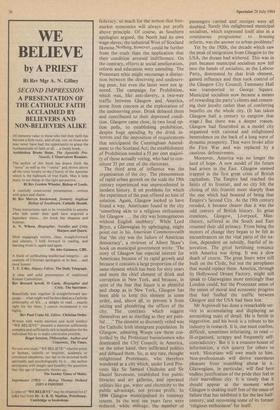Two-way traffic
Allan Massie
Portable Utopia: Glasgow and the United States, 1820-1920 Bernard Aspinwall (Aberdeen University Press £18.50)
Glasgow is sometimes described as the most easterly of American cities. `Most Glaswegians,' Mr Aspinwall tells us, 'preferred American to English movies, and John Grierson said "it was from America that we in Glasgow got our first sight of most things new in the arts' ". The rela- tionship isn't quite dead; West-of-Scotland writers like Alan Sharp, Gordon Williams, William Mcllvanney, Alan Spence and Alasdair Gray can more usefully be com- pared to American novelists than to their English contemporaries. Film is still a means of transmitting values and styles; three generations of Glasgow gangs found models in Cagney and George Raft; the reformed murderer turned pop-sociologist, Jimmy Boyle, is a figure that would be quite recognisable in America. Glasgow too has had the ethnic mix, brought about prin- cipally by the large Irish infusion, that characterised the great 19th-century American cities, New York, Boston, Chicago, Pittsburgh.
The similarities go deeper. Glasgow, like Manchester, Liverpool and Birmingham, but unlike London and Edinburgh, was primarily a manufacturing and commercial city. It was an expression of the 19th cen- tury's commitment to business and expan- sion. There was no old aristocracy to set the tone. Americans could recognise an affini- ty. It worked both ways. Glasgow saw that the USA made the same association of morality and business success, and had the same suspicion of the traditionalism of old Europe and old establishments. Great col- lecting merchant princes who were Also public benefactors, like Sir William Burrell, could be found in Glasgow and American cities alike. Both experienced the problem of poverty in the midst of plenty and at- tacked it with gusto and moral certainty. Glasgow still has the American air of being an unfinished city; it is characteristic that, even in a period of decline, it brazenly drove motorways the length and breadth of the city. It is still self-consciously ex- perimental, in the manner of American society.
Mr Aspinwall's purpose is to show how far it was a two-way traffic. If Glasgow now seems the most American of European cities, there was a great deal in 19th-century America that was Glaswegian in origin. 'Glasgow was seen as Utopia ... portable, indeed exportable ... It gave practical and businesslike expression to those qualities which would promote the Kingdom, the millennium, the triumph of the industrious and the respectable ... By 1900, far more than any other British city, Glasgow seemed to have established a thriving philanthropic polity ... it embodied the essential Scottish virtues, the attributes which Americans had needed over the previous century ... it showed the triumph of their kind of people.'
Traffic was continuous. By the mid- 1870s the Anchor Line offered a daily steamship service between Glasgow and New York — it was carrying 25,000 passengers on the route in 1870. It had 3,0(X1 agents in America selling package tours of Scotland. Americans felt at home there: the poet William Cullen Bryant had found Glasgow 'one continuous building site in- creasing with a rapidity almost equal to New York'. There was beauty too: the. high chimney of the St Rollex Chemical Works, 'Tennant's Stalk', 'rivalled the Pyramids or Strasbourg Cathedral'.
Apart from business association, there, were three particular areas in which Glasgow contributed to American develop- ment. The first was education. This century has made us cautious of boasting of the old superiority of Scotch education — so pitifully has our comparative standard declined. Things were different then. Scotland was the home of the democratic intellect — where better to export that idea than to the land of the free? Schools and colleges of the new Republic were plentiful- ly staffed with Scots — Mr Aspinwall gives a long list. Scotland, and Glasgow in par- ticular, provided a model. George Jardine, Professor of Logic at Glasgow University 1774-1827, had insisted in his Outlines of Philosophical Education on 'the vital im- portance of the sciences over the classics, the practical over the esoteric, the cultiva- tion of the total character of the student in contrast to the narrow limited specialist. The main aim of education was to make the pupil think for himself.' This was just what the young democracy needed. Jardine had been a 'pupil of Adam Smith; one of his own pupils, William Russell, was to play a part in the establishment of public educa- tion in the USA. He founded schools and the first educational journal in the English- speaking world, The American Journal of Education. He wrote text books and was Secretary of the American Institution of In- struction. What was being broadcast and instilled was the Protestant work ethic.
Inevitably that expressed itself also in projects of social reform. The anti-slavery campaign was vigorously supported in Glasgow, for slavery offended the human- itarian and democratic instincts of Scots- men. (The greatest popular hero of Victorian Scotland, David Livingstone, from Blantyre, Lanarkshire, was to fight the slave trade in Africa itself.) Anti-slavery had something in common with the anti- nuclear movement today: it was a moral issue that transcended frontiers. Glasgow, like Liverpool and Manchester, supported the North in the Civil War, even though economic interests — the cotton and tobac- co trades — should have tied it to the Con-
federacy; so much for the notion that free- market economies will always put profit above principle. Of course, as Southern apologists argued, the North had its own wage-slaves; the industrial West of Scotland likewise. Nothing. however. could be further from the truth than the implication that their condition aroused indifference. On the contrary, efforts at social amelioration, reform and education were unending. The Protestant ethic might encourage a distinc- tion between the deserving and undeserv- ing poor, but even the latter were not ig- nored. The campaign for Prohibition, which was, like anti-slavery, a two-way traffic between Glasgow and America, arose from concern at the exploitation of the undeserving poor. Drink debased them and contributed to their depressed condi- tion. Glasgow came close, in two local op- tion polls, to establishing prohibition, despite huge spending by the drink in- terests and the imposition of requirements that anticipated the Cunningham Amend- ment to the Scotland Act; the establishment of Prohibition needed a 55 per cent majori- ty of those actually voting, who had to con- stitute 35 per cent of the electorate.
The third area of influence was the organisation of the city. The phenomenon of rapid urban growth on the scale the 19th century experienced was unprecedented in modern history. It set problems for which the experience of the past offered no hint of solution. Again, Glasgow looked to have found a way. Americans found in the city `something akin to a religious enthusiasm for Glasgow ... the city was homogeneous without English snobbery'. While Lord Bryce, a Glaswegian by upbringing, might point out in his American Commonwealth that 'the city was the failure of American democracy', a reviewer of Albert Shaw's book on municipal government wrote: 'The story of Glasgow has especial interest for Americans because of its rapid growth and because it contains a large proportion of the same element which has been for sixty years and more the chief element of drink and corruption in New York, and because, in spite of the fear that liquor is as plentiful and cheap as in New York, Glasgow has been able to keep this element in some order, and, above all, to prevent it from seizing and plundering the offices of the city. The contrasts which suggest themselves are as startling as they are pain- ful ...' The element so discreetly veiled was the Catholic Irish immigrant population. In Glasgow, admiring Wasps saw them con- trolled by the Protestant businessmen who dominated the City Council; in America, on the other hand, they infiltrated politics and debased them. So, at any rate, thought enlightened Protestants, who therefore wondered at a city which, under Lord Pro- vosts like Sir Samuel Chisholm and Sir Daniel Stevenson, established free public libraries and art galleries, and operated utilities like gas, water and electricity to the public advantage, not private profit. In 1894 Glasgow municipalised its tramway system. In the next ten years fares were reduced, while mileage, the number of
passengers carried and receipts were all doubled. Surely this enlightened municipal socialism, which expressed itself also in a continuous programme to housing reform, was the answer to urban problems?
Yet by the 1920s, the decade which saw the peak of emigration from Glasgow to the USA, the dream had withered. This was in part because municipal socialism now fell into the hands of socialists, as the Labour Party, dominated by that Irish element, gained influence and then took control of the Glasgow City Council; Tammany Hall was transported to George Square. Municipal socialism now became a means of rewarding the party's clients and cement- ing their loyalty rather than of conferring benefits on the whole city. (It has taken Glasgow half a century to outgrow that stage.) But there was a deeper reason. Glasgow had flourished as a model city organised with rational and enlightened benevolence on the back of a long wave of dynamic prosperity. That wave broke after the First War and was replaced by a cautious defensiveness.
Moreover, America was no longer the land of hope. A new model of the future had arisen in the East. Glasgow seemed trapped in the first great crisis of British capitalism. The Empire had reached the limits of its frontier, and no city felt the closing of this frontier more sharply than the one which had boasted of being that Empire's Second City. As the 19th century receded, it became clearer that it was the odd century of British history. Its great creations, Glasgow, Liverpool, Man- chester, suffered as the South and East resumed their old primacy. From being the motors of change they began to be felt as encumbrances on the vital parts of the na- tion, dependent on subsidy, fearful of in- novation. The great fertilising romance with America was dying. It was a slow death of course. The great liners were still built on the Clyde, but not the aeroplanes that would replace them. America, through its Hollywood Dream Factory, might still speak to Glaswegians more enticingly than London could, but the Protestant sense of the union of moral and economic progress that had fuelled the traffic between Glasgow and the USA had been lost.
Mr Aspinwall has done a remarkable ser- vice in accumulating and displaying an astonishing mass of detail. He is fertile in suggestion, and his book is a tribute to his industry in research. It is, one must confess, difficult, sometimes infuriating, to read ill-organised, scrappy and frequently self- contradictory. But it is a treasure-house of information, a rich quarry for others to work. Historians will owe much to him. Non-professionals will derive enormous pleasure from stumbling about in it. Glaswegians, in particular, will find here endless justification of the pride they feel in their marvellous city. It is timely that it should appear at the moment when Glasgow is shaking itself free of the sense of failure that has inhibited it for the last half- century, and recovering some of its former `religious enthusiasm' for itself.











































 Previous page
Previous page